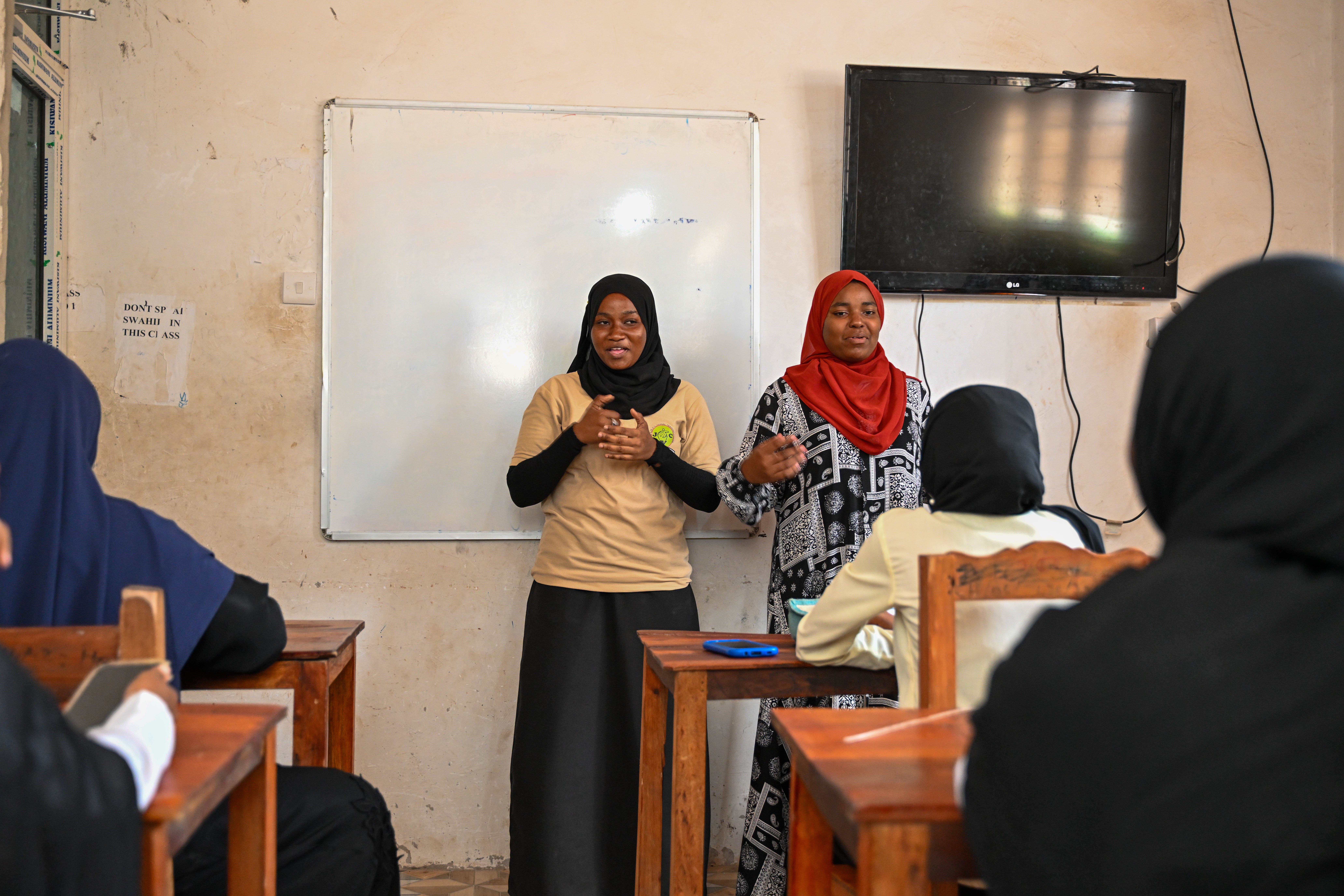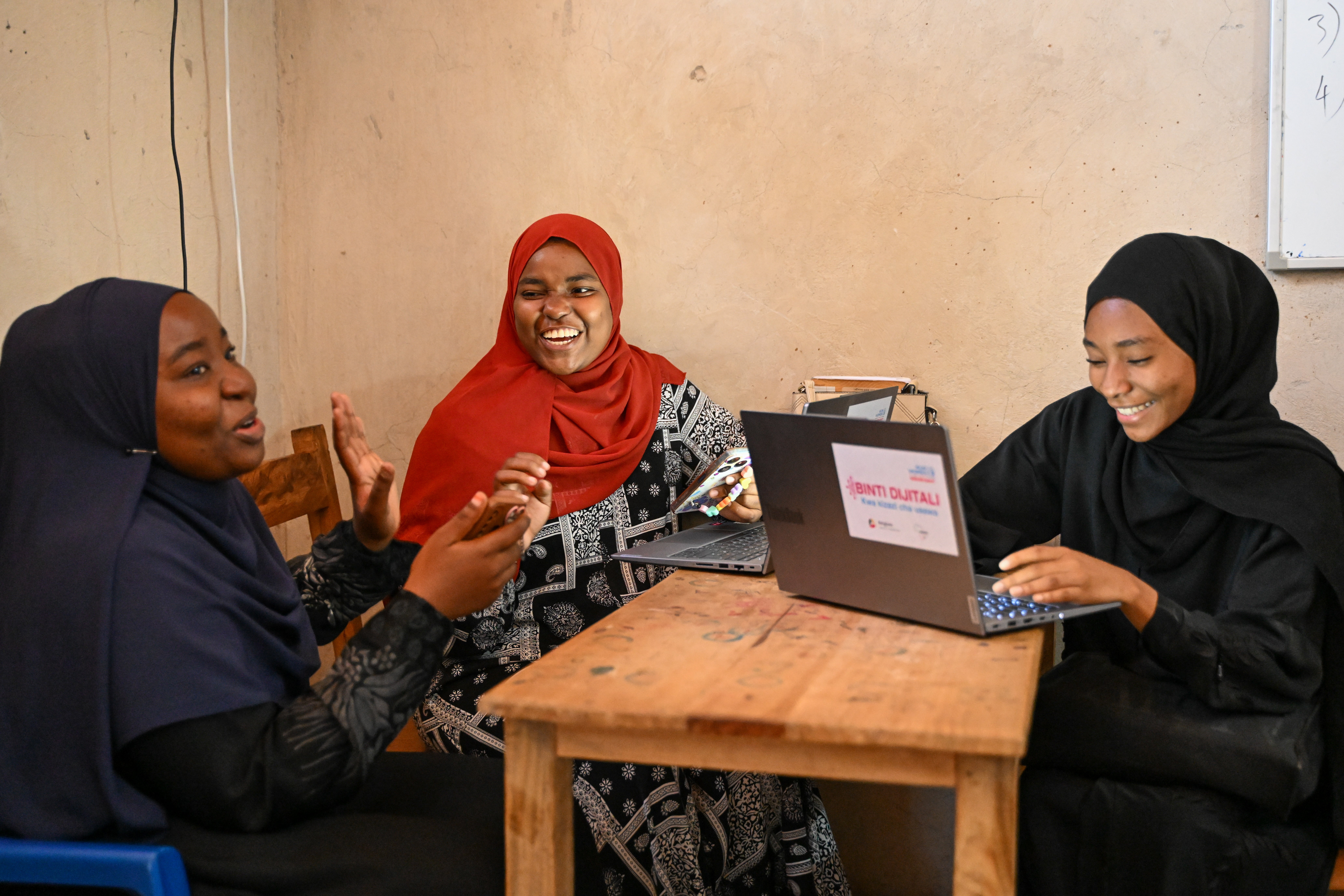From Coding to Community: Two Young Women Tackling Violence Against Women and Girls in Zanzibar
Date:

In 2023, Asma and Maryam attended a coding camp in Zanzibar as part of the African Girls Can Code Initiative “Binti Dijitali” program in Tanzania, an intensive two-week training camp aimed to equip participants with essential digital literacy and leadership skills while also raising their awareness on gender equality and women’s empowerment, including violence against women and girls (VAWG).
When they returned to their village of Mambosasa in western Zanzibar, they were determined to share the knowledge they had gained with others.
“We learned a lot about coding and robotics and got to connect and share what we learned with others,” Asma shared.
Months later, Asma and Maryam were invited to attend a workshop under the UN Women project on Ending Violence Against Women and Girls (EVAWG) in Zanzibar, supported by the European Union Delegation to Tanzania.
“The session taught us about sexual harassment and discrimination, which are very common in our society and in vocational training centers. We also learned about tech-facilitated violence and online sexual harassment,” Asma explained.
In Zanzibar, the 2022 Tanzania Demographic Health Survey reports that 8.4% of women and girls over the age of 15 have experienced physical violence, and 6.7% have experienced sexual violence in their lifetime. As part of interventions to address this, the UN Women EVAWG project is building the capacity of staff and instructors at vocational training centers (VTCs) in Zanzibar on issues of gender discrimination, sexual harassment, and abuse.

Armed with the new knowledge they gained, Asma and Maryam began working with the EVAWG project to raise awareness about violence against women and girls at the local VTC, where they teach sign language and use the classes as a platform to pass on what they had learned about violence and discrimination.
They’re using their skills to raise awareness among previously unreached audiences: “We made it a point to hold meetings with women in our area living with disabilities as they are often overlooked,” Maryam said.
Their work, they say, has not been without its challenges. As young women, their community is not always quick to give them an audience.
“When we first try to talk to people about harassment and discrimination, they tell us we are bothering them. But as we continue with our awareness sessions, we see them start to listen, and sometimes they even approach us later to ask more questions,” Asma added.
Aside from raising awareness about sexual harassment and discrimination, Asma and Maryam are also championing the rights of persons living with disabilities and are also using their sign language skills and knowledge to support persons with hearing disabilities at the district courts when they have a gender-based violence (GBV) related case.
“By helping people with hearing disabilities gain better access to their rights, we’re beginning to see many positive changes,” says Maryam.
The EU-funded project on Ending Violence Against Women and Girls aims to integrate effective, evidence-based violence prevention and response into existing local systems. In partnership with the Revolutionary Government of Zanzibar and local authorities, the project strengthens local actors’ capacities to promote freedom from all forms of gender-based violence and create safe spaces in tertiary education and communities.
“We chose to work with Asma and Maryam after the Binti Dijitali program because of their passion and willingness to help others,” said Jesca Msafiri, UN Women Tanzania’s Programme Officer for Ending Violence Against Women. “As young women in vocational training, they are well-positioned to help us reach more people, especially youth in VTCs, who are greatly affected by sexual harassment and discrimination.”
Asma and Maryam are optimistic about the future. “Change doesn’t come suddenly. It starts with each person taking the challenge to go and tell someone else so that change can happen,” Asma said.